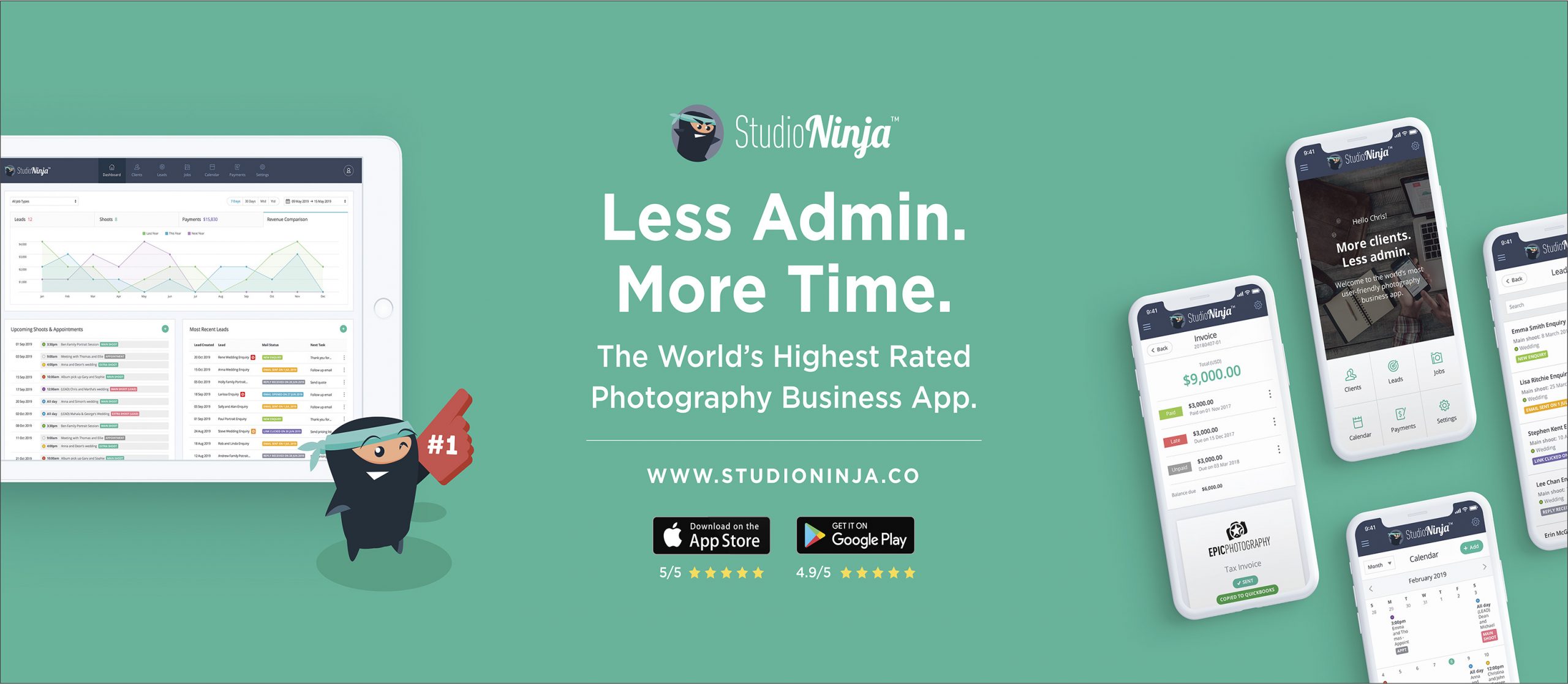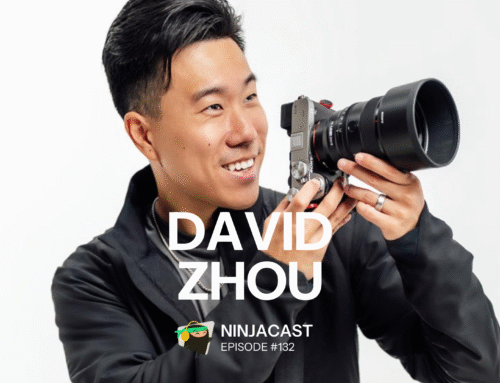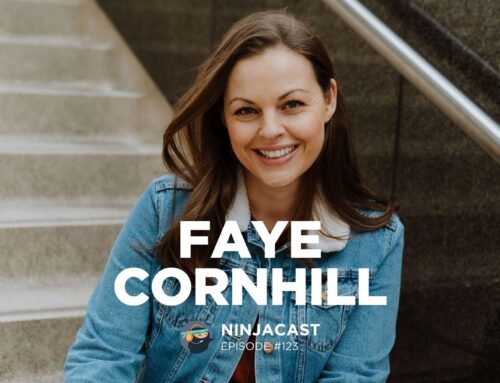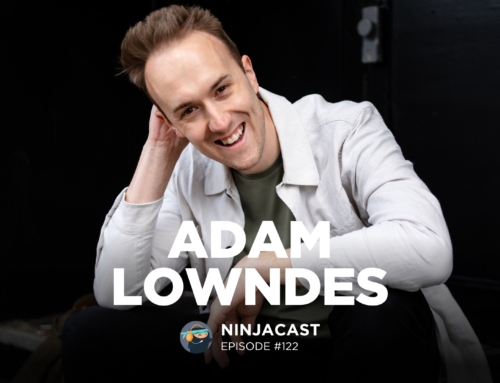018: Natalie Watts – How to Step out of Your Comfort Zone & Going From Single Teenage Mum to Successful Business Woman
January 15, 2021
“Believing in yourself is the best thing you can do for your business!”
NATALIE WATTS
Hey everyone! It’s Sally here, from Studio Ninja. Today’s episode is all about Natalie Watts – we are really excited to have her on the show.
Natalie Watts of Natalie J Weddings is a wedding photographer and educator based near London, UK. She has been self-employed in photography for over 10 years, with a background in fashion photography before moving to weddings in 2014.
To date, Natalie has photographed 230 weddings in locations including Hawaii, Iceland, NYC, Paris and Venice, and was named one of Rangefinder’s Rising Stars of Wedding Photography in 2019. Her education courses include the popular ‘How to ACE Group Shots’ and ‘Success Accelerator’ – Photography Business course – and Natalie also offers 1-to-1 mentoring for photographers.
Check out some of the biggest points from Natalie’s interview below:
Can you delve a little bit more into your journey, kind of right back to when you first started?
So I’ve always been into photography. I got my first camera when I was about six or seven from Santa. It was just like a little point and shoot. I don’t even remember what make it was, but way, way, way back when I was really little, I used to really enjoy taking photographs on family holidays and of my friends and things like that. Growing up, I was always the one that had a camera in their hand. Obviously, it was film photography. I would go and get it printed. I think I used to use Triple Print a lot. I don’t know if you remember them, but you sent off the cartridge, you got a big print and two smaller prints.
So I took a lot of photographs growing up. And then I got pregnant with my son when I was 17. So that was a bit of a shock. Left college, I was at college doing Math, Psychology and Fine Art as well. So I left college, worked full time. And then when my son was 18 months old, I went back to college and I did a foundation degree, which was a Fine Art foundation degree. So that was at college. I did that part-time for a year and then I did it full-time for a year.
So when I went in to do it full-time for a year, you have to specialize in one medium and mine was photography. Back then, it was in the dark room because there was no digital cameras back then. So I think we’re talking like 2002 or 2003, I think that was. So I did Fine Art, but specialized in photography; my final project was in photography.
And part of that college course was that you had to apply to university, and I never had any aspirations of going to university. I didn’t really think that I could make it happen. Being a single teenage mom, didn’t think that I could make it happen. I was the only one on my course that got into their first wish university.
Following that full-time course at college, I went to Nottingham Trent University and did the photography degree there for three years. But alongside my degree, I did lots of other projects. So that was either personal projects, that was shooting companies for money, shooting for magazines. And I also did a lot of work experience. So the course program meant that you had to do one piece of work experience, but they didn’t actually help you do that. So I went out of my way and actually got three work experience placements.
One was that a photo agency called Photo Shops in London. One was at Bizarre Magazine, which I don’t know if you’ve heard of it. It was kind of a little bit burlesquey, a little bit kind of the weird and wonderful. So I did work experience there. And then I also did work experience at Marie Claire, which was also down in London. So my final project at university was really interesting, actually. It was about pets and their owners, but a kind of slightly macabre, dark twist on it. So it was kind of, pets and their owners.
I got a 2-1, and I was absolutely devastated because I put so much into it. I’d organized an opening evening with burlesque performers, and I even had a drink sponsor. I had posters made up that kind of thing. So for your degree show, so you could either put a book together or have an opening evening, like an exhibition and European evening. Honestly, I didn’t work on my dissertation and that’s what brought that mark down, but that still meant that I had a portfolio. I always knew that I wanted to move to London. So I actually got a job at ASOS, and back then, nobody really knew who ASOS was. I went down there with my portfolio, full of burlesque photographs and these pet portraits and all of the photographs that I’d taken for clients throughout my time at university, and I got the position at ASOS.
Back then, they had one studio running maybe three days a week. So it was really quite a small company. And in the two years that I was there, I started just photography and I ended as the studio manager and sometimes running a team of up to 16 people.
But when I left, they were just about to open their sixth studio, running six or seven days a week. So you can really see the growth throughout that two years that I was there. I actually got head hunted for a company called Figleaves, which is online lingerie fashion for online lingerie and swimwear. And I got paid a lot more than I did at ASOS, but the company was based outside of London.
So my son and I were living in London and I was having to run and drop him off at the childminders, run to the train, get a train out of London to Welwyn Garden City, and then back again. So it was really, really all go; single mom doing these school runs. And at the same time I was working for personal projects, building up my portfolio at lunchtimes evenings and weekends. So it was really, really full on.

Which marketing techniques do you feel have really worked for you?
So I think I’ll start off by saying, is that in terms of marketing, different things work for different people. So some people go to big wedding fairs and they book up for the next year or two. Other people wedding fairs doesn’t work. So it is kind of about finding out what works for you, where your client is, and really, not only targeting them, but being where they can find you as well. For me personally, I like to do a booking origin exercise every year.
I mean, this year is as an anomaly, so we won’t look at this year, but for instance, in 2019, most of my bookings came from Instagram, and then it was referrals. So that’s either referrals from past clients or from other photographers. So I think it is really important to, focus on that community at non-competition elements, because everyone is kind of lifting each other up at the same time. You find that really nice community around you.
SEO, Google that works for me as well. So I’ll note that that’s not only my blog, but people find me on other blogs as well, as I feature blogs such as Rock My Wedding, and other big wedding blogs. I also get a lot of previous wedding guests booking me, because they like how I work on a wedding day. Sometimes they book me without even seeing the images, which is interesting, but they just say, “We like how you worked on the wedding day,” which is why it’s really important to be very aware of how you are conducting yourself on a wedding day. Then a couple through wedding planners, and also there were a couple of three wedding fairs as well, but I’ll note that they were wedding fairs that I had done sort of two or three years previous.
So I find that wedding fairs that tends to be a really, really long lead time on it. Whereas with things like Instagram and features, that’s more of a shortly time. People are kind of finding you in real time, rather than holding onto your card for years and then booking. So I think it is really important to have quite a few different streams of inquiries and where people find you, because if you’re putting all your eggs in one basket and just focusing on one area, then what happens if Instagram gets deleted or your wedding planner stops trading or for whatever reason, clients stopped recommending you, that kind of thing. So I think it’s really important to have a few different streams of people finding you and inquiry.

For people that are starting out or are feeling a little bit, like they’ve lost their way after this year, what are your top tips for the couples’ portrait side of things, getting those really creative, natural, authentic images?
You’re not alone in that. I shot my first wedding on the 15th of August and then the one before that was on New Years Eve, so there was an eight-month gap. And I felt really out of my comfort zone with it because I wasn’t used to doing it. The next one was, it was okay, but I still felt a little bit awkward. What I tend to do is get the safe shots first and then get more creative. But I think couples feed off your energy and how confident you are with it. So the first wedding or two, I didn’t really feel that confident, and I feel like I maybe didn’t get as strong images as I could. Obviously get the shots at the couple of happy with, and then get the shots that you want to create and the shots that you are happy with.
But I think it comes with experience and also consistency as well. So when you’re immersed in it, you get in a flow with it. That’s why I’m really disappointed with the second lockdown that weddings have stopped again, because the couple of weddings that I shot right before down, I feel like I absolutely nailed it. And that’s such a great feeling as a photographer and not just to myself, but I know for the couple, because they phoned me up crying. So I feel like you do need to be consistent with it. So for that reason, I would say, get out there, take maybe creative portraits of yourself. If you can set your camera up on a timer, do some creative portraits with your other half.
We are allowed to go outside. I think we can take photographs of the people outside. So maybe just do a couple of engagement shoots, family shoots, portrait shoots, things like that because it’s like riding a bicycle. You do get back onto it very easily, but there is that little bit of a wobble in the beginning. And then when you really get into your stride with it, that’s when it just becomes much easier to get into that creative flow. I think the key thing is just to be consistent with it and for people that are just starting out, if they don’t have much confidence with couple shots, practice.
It’s not the new lens that’s going to help you, it’s you, that’s going to help you. So I think it’s really important just to get out there and practice. And I still do this sometimes. When I travel, I find couples to do creative shoots with, and that really helps me push myself, really hone in on my style and push myself creatively. So I still do it. 10 years into business, five, six years into weddings now, I still do that. So for anyone starting out, I would definitely recommend to do that.

Thank you!
Thanks again to you all for joining us and a huge thanks to Natalie for coming on and sharing her thoughts and ideas!
If you have any suggestions, comments or questions about this episode, please be sure to leave them below in the comment section of this post, and if you liked the episode, please share it using the social media buttons you see at the bottom of the post!
That’s it for me this week, I hope you all enjoyed this episode.
See you soon,
Sally
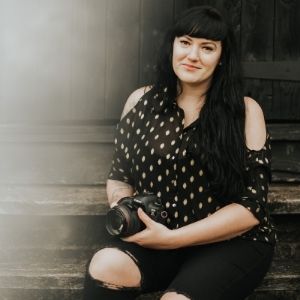
About Natalie Watts
Natalie Watts of Natalie J Weddings is a wedding photographer and educator based near London, UK. She has been self-employed in photography for over 10 years, with a background in fashion photography before moving to weddings in 2014. To date, Natalie has photographed 230 weddings in locations including Hawaii, Iceland, NYC, Paris and Venice, and was named one of Rangefinder’s Rising Stars of Wedding Photography in 2019. Her education courses include the popular ‘How to ACE Group Shots’ and ‘Success Accelerator’ – Photography Business course – and Natalie also offers 1-to-1 mentoring for photographers.
